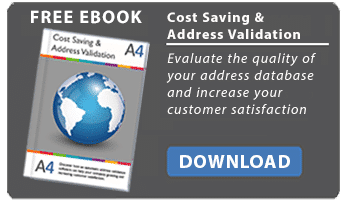
In international jargon we speak of API address validation in reference to the set of tools that allow us to satisfy this type of requirement by means of a web service interface. It goes without saying that there are multiple versions of API for address normalization, from those that can be integrated into e-commerce to suggest the correct address to customers when purchasing (and avoid unpleasant delays, returns, etc.), to the address validation APIs for business applications, able to validate and correct the addresses of existing databases. Shipments and search for roads remain the main objectives of API address normalization, but the features offered by a web service of this type go further. Let’s see in detail the services that can be activated with API in a business application.
1) API ADDRESS VALIDATION FOR AUTOCOMPLETION
API address validation for autocompletion enables verifying the quality of the postal addresses in real time, during the data entry operation by the user or by the person in charge. In this case the normalizer compares the partial address with the database of addresses in the archive, selecting the alternatives that can complete the record. A similar approach effectively clears the margins of error because it excludes the misprints and oversights of those who enter the address. All the user has to do is click on the right address and continue filling out the form.
Here find more information about validation for autocompletion
2) API ADDRESS VALIDATION FOR POSTCODE LOOKUP
The postal code is a precious datum for numerous business, analysis and marketing purposes. Yet this element is too often ignored or forgotten or transcribed without due attention. If you want to check a single address or an entire database and enrich it with the corresponding postcodes, perhaps to identify an area of the territory with the same code, you can integrate your company applications for the normalization of postal codes using API. Rapidly the address normalizer goes back to the code and assigns it to the relevant address, reporting any ambiguity and/or obsolete data in the reports.
Here find more information on validation for postcode lookup
3) API ADDRESS VALIDATION FOR INTERNATIONAL FORMATS
In a global world the exchange of goods takes on increasingly international dimensions. When you ship abroad, it is important to ensure that the address shown on the package or on the bill respects the format of the destination postal system. Exploiting an address normalizer integrated in the company via API to validate addresses and translate them into the international format is an ideal solution to shorten the time and hit the target at the first attempt.
Here find more information on validation for international formats
4) API ADDRESS VALIDATION FOR GEOCODING
Another of the address validation options is geocoding, i.e. translating a postal address into its main geographical coordinates (latitude and longitude). As for the other services, also for geocoding remember that the datum is first reviewed, cleaned, completed, and only at this point transformed into geographic coordinates. The validation can be direct or reverse, so either from the address to the coordinates, or from the coordinates to the address. Among the applications supported are GIS, geomarketing software and IT systems in general.
Here find more info on address validation for geocoding
HOW TO IMPLEMENT API INTO YOUR APPLICATIONS
Web masters, warehouse managers, CRM experts and developers could ask themselves at this point how to move from theory to practice, and consequently how to implement an API in ecommerce applications, websites, portals and management systems. To answer we must first explain how an API works.
Acronym of Application Programming Interface, the API is a sort of intermediate vocabulary between two different programs. The two programs, in our case, are on the one hand the corporate application and on the other the Address 4 engine for address validation. The API ensures perfect communication between the two, offering an intuitive and fast user experience and navigation.
Having clarified this point, effective integration requires the customer being able to count on a developer capable of reading and interpreting the API Address 4 documentation, implementing the API into the company application. This is a step that does not exist in other uses of the software, primarily in the online version. However, we must first underline a further distinction, namely that the API guarantees, by its nature, a very high level of customization, synonymous with greater control and freedom of query management. Those looking for maximum performance and versatility will discover an effective, autonomous and universal support in the API version of Address 4 for address validation covering an area that currently exceeds 250 countries, from Europe to Oceania.
THE ADDRESS 4 DEMO FOR ADDRESS VALIDATION
For an experienced developer, the Address 4 API is easy to integrate into any application. For those who do not think they are sufficiently familiar, it is obvious that a shot in the dark becomes more complex. We at Address 4 have decided to solve the problem in the simplest way possible: by offering anyone interested the opportunity to experience the potential of the software, and therefore of the API, through a free trial available from our site. By registering without commitment to the demo you will get several advantages, including:
-
Free trial credits
-
Access to advanced features
-
Ebook on Data Quality
-
Online database validation
-
Automatic address database update without installation
To start the trial right away, just fill out the form. In less than 60 seconds you can choose a username for your account and accept the terms & conditions and privacy & cookie policy. Once the validation service has been evaluated, you can request a quote at no cost and then proceed with integrating the normalizer via API into your application. Data coverage can be viewed on the map on the dedicated page. For more information on the benefits of address validation, please download the free ebook Address normalization and cost reduction. Receive it by email and make your business more competitive.




